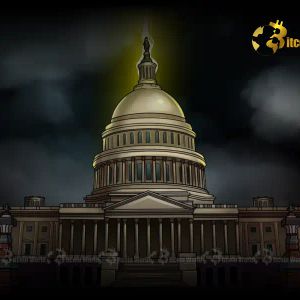Crypto Bills Face Uncertain Future as US House Stalls Legislation
5 min read
BitcoinWorld Crypto Bills Face Uncertain Future as US House Stalls Legislation The anticipation for significant progress on crypto legislation in the United States House of Representatives was palpable, but July 16 brought an unexpected halt. For many in the digital asset space, the news that no further votes were scheduled for the evening signaled a frustrating pause in the ongoing efforts to establish clear regulatory frameworks for crypto bills . Understanding the Stalled Crypto Bills in the US House The cryptocurrency community watched closely as the U.S. House of Representatives convened, hoping for breakthroughs on pivotal crypto bills . However, those hopes were tempered by a recent update from Eleanor Terrett, host of Crypto in America, who reported via X that July 16 concluded without any further legislative votes. This information, relayed from an email by House Majority Whip Tom Emmer, confirms a significant slowdown in the legislative process for digital assets. The immediate impact of this pause is the continued uncertainty surrounding key pieces of legislation designed to provide clarity and structure to the burgeoning crypto market. Terrett’s report highlighted specific details that shed light on the current state of affairs: Nine Republican Lawmakers Voted Against: A notable number of Republican representatives cast votes against a crypto bill, indicating internal party divisions or strong opposition to specific proposals. Three Members Yet to Vote: The absence of votes from three members adds another layer of complexity, potentially signaling undecided positions or strategic delays. Unclear Next Steps: Perhaps the most pressing concern for the industry is the lack of a clear path forward, leaving stakeholders guessing about when and how these vital bills will be revisited. This development underscores the challenges inherent in pushing forward comprehensive legislation for an innovative and rapidly evolving sector like cryptocurrency within the complex machinery of the US House . Why is Digital Asset Regulation Facing Legislative Gridlock? The stalling of digital asset regulation is not an isolated incident but rather a symptom of broader challenges facing lawmakers as they grapple with the intricacies of Web3 technologies. Several factors contribute to the apparent legislative gridlock that currently ensnarls efforts to regulate cryptocurrencies: Bipartisan Disagreement: While there’s a general consensus on the need for regulation, the specifics often lead to deep divisions. Republicans and Democrats frequently disagree on the scope, enforcement agencies, and even the fundamental classification of various digital assets. Complexity of the Technology: Cryptocurrency and blockchain technology are inherently complex. Many lawmakers and their staff are still learning the nuances, making it difficult to draft effective legislation that doesn’t stifle innovation or create unintended consequences. Lobbying Efforts: Diverse lobbying efforts from various crypto industry players, traditional finance, and consumer advocacy groups can pull legislators in different directions, making it challenging to forge a unified path. Political Priorities: In a busy legislative session, crypto bills often compete with other pressing national issues like the economy, healthcare, or foreign policy. Unless there’s a perceived immediate crisis or strong public demand, crypto legislation might not receive top priority. The specific instance of nine Republican lawmakers voting against a crypto bill, as reported, highlights that even within a single party, there isn’t always a unified front on how to approach digital assets. This internal dissent, combined with external pressures, contributes significantly to the current state of legislative inertia. The Impact of Congressional Crypto Delays on the Industry The ongoing delays in establishing clear Congressional crypto frameworks have tangible and far-reaching impacts on the entire digital asset ecosystem. Without definitive rules, businesses, investors, and developers operate in a perpetual state of uncertainty, which can hinder growth and innovation. Challenges for the Industry: Innovation Stifled: Startups and established companies alike hesitate to launch new products or services in the U.S. due to fear of future regulatory crackdowns or sudden shifts in legal interpretations. This can drive innovation offshore. Investor Uncertainty: Retail and institutional investors alike are wary of committing significant capital when the regulatory landscape remains opaque. This can lead to reduced liquidity and market volatility. Competitive Disadvantage: Other jurisdictions, particularly in Europe and Asia, are moving faster to establish clear crypto regulations. The U.S. risks falling behind in attracting talent, capital, and technological leadership in the digital asset space. Consumer Protection Gaps: While some argue for less regulation, the absence of clear rules can leave consumers vulnerable to scams, market manipulation, and irresponsible practices, undermining trust in the broader crypto market. Conversely, clear and thoughtful regulation could bring immense benefits, fostering greater institutional adoption, enhancing market stability, and providing a safer environment for all participants. The current delays mean these potential benefits remain largely unrealized. What’s Next for US House Crypto Legislation? With no further votes scheduled for July 16 and the next steps “unclear,” the path forward for US House crypto legislation remains shrouded in ambiguity. However, the legislative process rarely truly stops; it merely shifts gears or enters a new phase. Stakeholders are now keenly watching for several potential developments: Committee Work: Even if floor votes are stalled, committees (e.g., Financial Services, Agriculture) may continue to hold hearings, markups, or negotiate behind closed doors to refine existing bills or draft new ones. Leadership Strategy: House leadership, including Whip Tom Emmer, will likely assess the reasons for the opposition and strategize on how to garner sufficient votes for future attempts. This might involve amendments, compromises, or bundling crypto provisions with other legislation. Industry Advocacy: Crypto advocacy groups will undoubtedly intensify their lobbying efforts, aiming to educate lawmakers and push for favorable legislation. External Events: Major market events, technological breakthroughs, or enforcement actions by regulatory bodies (like the SEC or CFTC) could create new urgency or shift political will. For individuals and businesses involved in the crypto space, staying informed and engaged is paramount. Understanding the nuances of these legislative hurdles and advocating for sensible regulation can play a role in shaping the future of digital assets in the United States. The recent pause in crypto bills votes in the U.S. House of Representatives serves as a stark reminder of the complex and often arduous journey towards comprehensive digital asset regulation. While the immediate future of these crucial legislative efforts remains uncertain, the underlying need for clarity and robust frameworks persists. The industry, lawmakers, and the public must continue to engage constructively to navigate this challenging landscape, ensuring that the U.S. can foster innovation while protecting consumers in the evolving world of cryptocurrency. To learn more about the latest crypto bills and digital asset regulation trends, explore our article on key developments shaping Congressional crypto policy and its impact on market stability. This post Crypto Bills Face Uncertain Future as US House Stalls Legislation first appeared on BitcoinWorld and is written by Editorial Team

Source: Bitcoin World



